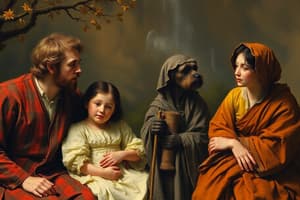Podcast
Questions and Answers
What does the narrator feel about her culture?
What does the narrator feel about her culture?
- She hates it completely and wants to abandon it
- She only loves the food and music, but not the people
- She is indifferent and has no strong feelings about it
- She loves and appreciates many aspects of it (correct)
Why does the narrator suggest that Latinos have brown skin?
Why does the narrator suggest that Latinos have brown skin?
- She believes their passionate nature cooks them from the inside (correct)
- Due to excessive exposure to the sun
- As a result of their genetic makeup
- It's a requirement to be considered truly Latino
What is the narrator's attitude towards the stereotypes about Latinos?
What is the narrator's attitude towards the stereotypes about Latinos?
- She believes they are exaggerated but have some truth
- She thinks they are completely false and fabricated
- She finds them highly offensive and inaccurate
- She acknowledges that many of them are unfortunately true (correct)
Which of the following is NOT mentioned as a stereotype the narrator acknowledges?
Which of the following is NOT mentioned as a stereotype the narrator acknowledges?
What does the narrator imply about her language abilities?
What does the narrator imply about her language abilities?
What does the narrator likely do in her family, based on the passage?
What does the narrator likely do in her family, based on the passage?
What was the drunkle's intention in offering the beer to Miguel?
What was the drunkle's intention in offering the beer to Miguel?
What was the mother's reaction to the drunkle offering the beer to Miguel?
What was the mother's reaction to the drunkle offering the beer to Miguel?
What does the narrator's comment about Miguel becoming 'another brown-skinned alcoholico' suggest?
What does the narrator's comment about Miguel becoming 'another brown-skinned alcoholico' suggest?
Why did the drunkle eventually stop Miguel from taking another sip of the beer?
Why did the drunkle eventually stop Miguel from taking another sip of the beer?
What does the narrator's use of the term 'drunkle' suggest about their relationship with him?
What does the narrator's use of the term 'drunkle' suggest about their relationship with him?
What does the passage suggest about the mother's authority in the household?
What does the passage suggest about the mother's authority in the household?
Flashcards are hidden until you start studying
Study Notes
Family and Culture
- The narrator is the oldest daughter in a family of seven and is responsible for various household chores.
- She loves her cultura (culture) and the warmth of her people, but also acknowledges the stereotypes associated with it.
Stereotypes and Reality
- The narrator admits that some stereotypes about Latinos are true, such as:
- Overcrowding vehicles
- Having many children at a young age
- Not speaking English and being hesitant to learn the language
- Letting children run around without proper supervision
A Family Scene
- The narrator recalls a scene where her drunkle (drunk uncle) offers her eight-year-old brother, Miguel, a sip of beer.
- Despite their mother's protests, the drunkle persists, saying it will "make him a man."
- Miguel eagerly takes a sip and starts to glug the beer, worrying the narrator that this might lead to a future of alcoholism.
Family Dynamics
- The narrator's mother is weak in her protests against the drunkle's actions.
- The drunkle disregards the mother's concerns and imposes his will on the family.
Studying That Suits You
Use AI to generate personalized quizzes and flashcards to suit your learning preferences.




